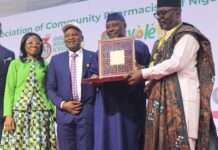
Dr (Pharm.) Michael Oyebanjo Paul is the chief executive officer and managing director (MD/CEO) of Mopson Pharmaceuticals. He is reputed to be one of the earliest indigenous pharmaceutical manufacturers in Nigeria.
With a pharmaceutical manufacturing pedigree spanning four decades, he has made his presence felt in the industry with many products of excellence. He has also been very active in the leadership of the pharmacy profession in Nigeria and beyond with influential roles in the PMG-MAN and the PSN. In this interview with Pharmanews, he discusses several issues surrounding pharmaceutical manufacturing in Nigeria – highlighting the prospects and challenges, as well as offering insights on how government, regulators and pharmacists themselves can improve the situation. EXCERPTS:
What would you describe as the key drawbacks of doing pharmaceutical manufacturing business in Nigeria?
In the past few years, the problem facing the industry has been the unsteady regulation of the exchange rate policy in Nigeria. As at the time I started 40 years ago, naira was two to a pound. Then, the dollar was between 50 kobo and one naira. Prices and lifestyles were regulated by the constancy of that time.
But when naira took its first bad turn during the regime of Babangida – one dollar to ten naira – many companies folded up because their capital could not cope. It was so traumatic that companies that used to be in the pharmaceutical industry, such as AJ Seward, West African Drugs and many distributive systems, had a really bad time.
The greatest evil has been done to this country by uncontrolled and unregulated foreign exchange policy. You can imagine that, about four months ago, the dollar was 360 naira and people managed to cope with it but today it has risen to 450 naira in the same market. When this happens, everyone is affected.
I have been going to India for the last 30 years. Their currency, the rupee, has remained consistent at between 40 and 41 to a dollar for over 25 years. It has not changed. The same cannot be said of the naira which has continued to be unstable. It is hard to imagine that the same naira was once two to a pound and remained so for about ten years.
I graduated from the university in 1973 and was serving in 1974 when the naira changed. We were the first set of the NYSC scheme and so, I remember vividly how things were then. People enjoyed their money then. Those who could not afford a car bought motorcycles and those who could not afford motorcycles bought bicycles.
When we graduated, the moment you completed your NYSC programme, you were given a car which you paid for gradually. There was also the car allowance which was as much as the cost of the car itself. The fall of the naira brought about so much trauma in the economy, forcing many companies to shut down. The trauma, the uncertainty and the lack of economic vision was untold.
Even in this COVID-19 era, instead of the Nigerian government to make things easier for its people, the opposite is the case. The CBN COVID-19 loan regime stipulates an interest rate of 10 per cent, whereas my colleagues in the US and the UK enjoy between one and two per cent.
You can’t have a long-term plan in Nigeria because of the uncertainties pervading the business atmosphere. I think government should do something about stabilising and strengthening the naira in order to make the business environment friendly, not only in the pharmaceutical industry but in every area of our economy. They should reduce interest rate to five per cent maximum in order to encourage the spirit of industry amongst investors.
To what can we attribute the preponderance and seeming preference for foreign drugs in Nigeria?
It is colonialism. When you depend on some people, it means that, without them, you can’t exist. Look at chloroquine. In January, we were buying it for 9,000 naira; today, we are buying it for 240,000 naira. India is restricting their product to their people. Everybody in that country is taking chloroquine.
In China, with their large population, they are taking chloroquine, not because of malaria. America too is taking chloroquine, not because of malaria. So, the world’s demand for chloroquine is so high. It is so embarrassing and it is not in the best interest of Nigeria to keep relying on India and China for pharmaceutical raw materials.
Unfortunately, there is no other option. We either manufacture locally (which we don’t do) or we keep importing at exorbitant rates. The only thing I don’t import for my pharmaceutical manufacturing business is water. But I spend money to treat and refine the water. So, you can see how difficult it is to do business in Nigeria.
When you import anything into Nigeria, all the gains – like workmanship and labour – go to the exporting country and nothing comes to you. The Nigerian economic policy has to be restudied and revised, with a new financial order instituted, if we must catch up with India and China.
How can Nigeria overcome the menace of fake and substandard drugs?
NAFDAC should control the trend. NAFDAC tests and then goes ahead to regulate the industry but they should go into town and sample products from stores and not from manufacturers. That is the only way they can identify fake and unregistered products.
Testing should be followed by market sampling. They can send someone to go and buy anonymously and collect receipts so that they can ascertain the true status of products in the market – and so that they can know who is doing what.
A fake drug is one that is purported by people who did not make it. If someone removes Mopson and puts Nopson, that is nomenclature faking. If my product’s colour is copied, it is called colour faking, whereas if my graphics are copied, it is called graphics faking. It may interest you to know that some fake drugs pass while some genuine ones fail.
Another thing is product adulteration. Some people come up with products without declaring some of the contents. If people follow the original BPC (British Pharmaceutical Codex) for codeine, it would not intoxicate anyone. I have been producing codeine for over 35 years. We used to buy the raw material from NAFDAC; it was not controlled as such. Now, we buy it from the ministry and compound it to give to people.
When I was very young, I knew my father was taking codeine but it never intoxicated him. In Nigeria, it is controlled or banned. In the UK and several other countries, it is still OTC. It is abused in Nigeria and some people among us manufacturers do it. I don’t change my formula because I want to make some millions and I don’t sell codeine except a doctor brings a prescription for it. When it comes to fake products, we pharmacists should search ourselves.
What is unique about Mopson’s products?
Ascorbion C300 was developed by a group of scientists, including me. The reason we developed the product was because most of the vitamin C products in the market were not having a long shelf life. I, Professor Tayo from the University of Lagos, Professor Olaniyi from the University of Ibadan and Professor Coker, alongside other people, sat down together in my office and said we wanted to formulate a product that would stand the test of time.
We started looking at parameters that favoured that stability of vitamin C. We were studying and performing experiments. When we concluded our experiments, Professor Olaniyi gave Ascorbion C300 two-and-a-half years’ lifespan, even in very adverse conditions.
We still have samples that are giving us 94 per cent stability ten years later and that is why we advertise it as a potent and stable Vitamin C. many people have approached me for the formula. It is the most potent Vitamin C in the market. Our products are called products of excellence. We are very strict with our production procedures and formulas.
How often do you participate in PSN activities?
When we were younger, we were very active in the activities of PSN, though I never contested for any position. We followed every PSN activity closely. Then, I was among those who started PMG-MAN at Pfizer. We wanted to harmonise local manufacturing so that we could influence government’s policy on pharmaceutical manufacturing. I became the vice president and that was it. I am still a member of the executive committee and a patron of PMG-MAN. I am actively involved with PMG-MAN.
Tell us briefly about your family life.
Family life starts from the day you marry and lasts for about 25 years. It is not age-related because there are people who still live with their parents up to the age of 25 years.
Family life is sweet when father and mother come together in love and produce fruits which are the children. Once the children become 18 years and above, the zest of family life reduces. Some parents are lucky that their children still visit them to show love, even after moving on to start their own families. It is usually a kind of law of reciprocity for the love they had shown to their children when they were growing up.
I am a happy family man; I have my children and grandchildren who always come to visit me when they are on holidays. They are a source of happiness. If you want to enjoy married life, then love your wife because, if you scatter your family, you will live to suffer the consequences.
Do you have other interests and hobbies?
I love football but I don’t have the patience to watch football matches. I am only interested in the results. While visiting London years ago, I had gone to Wembley Stadium to watch a football match in the company of friends. In the course of the match, I slept off. My friends did not find it funny that I could sleep in the stadium after buying a ticket for the match.
I love playing table tennis and I also do a lot of long distance trekking, up to five miles. Above all, I love reading the word of God. I am a devout Catholic and my wife is a very great fan of the Lumen Christi TV channel. She follows their mass and catechism religiously.
What’s your advice to new and upcoming pharmaceutical manufacturers?
I started by compounding for chemists and for hospitals. My compounding was so popular in Lagos that when you talked about me, you talked about people like Moko. Though Moko started five or ten years before me, I joined later and still made a mark amongst the compounders of those times.
That grassroots development – whereby you start from somewhere and graduate to the level of a mass manufacturer – is no longer there. If we don’t take time, the big companies will start employing pharmacists, instead of pharmacists setting up their own companies. Such a trend will not augur well for the profession.
I will advise NAFDAC to start promoting dispensing pharmacy. That was where I started from. Young and upcoming pharmacists should be patient enough to follow the normal growth process.














medications without a doctor’s prescription: https://genericwdp.com/ buy prescription drugs
tadalafil 60 mg for sale: http://tadalafilonline20.com/ tadalafil